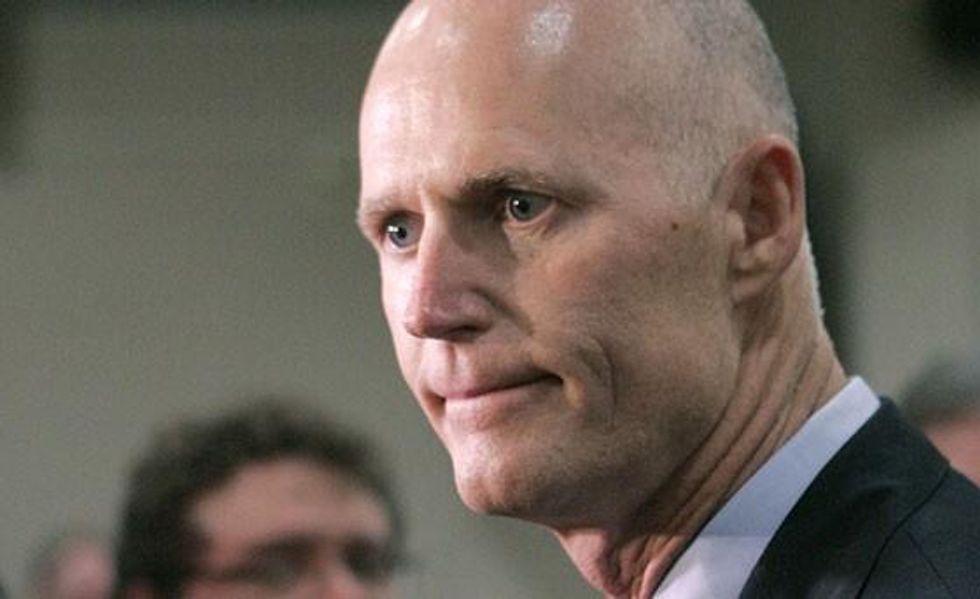More Than the Sequester Clock Is Ticking

Last night, I underwent an unintentional thought experiment: My husband noticed there was no clock in my home office and offered to buy me one as a gift. That would be great, I said, just please don't get one of those battery-driven clocks with their annoyingly loud tick-tock. No sooner had I said that than I heard the battery-driven tick-tock that had been pounding away in my office for a couple of years.
The ticking was coming from my kid's alarm clock, which I'd shoved onto a bookshelf after he'd complained about it. I spend most of my waking hours in this room, so how was it possible that I didn't notice the ticking for years? Is the power of the mind so strong that it can block out sound--and was the power of suggestion (in this case, the mere mention of a clock) so strong that it could instantly unblock those sounds? I don't want to get all tell-tale heart about it, but, once reminded of it, I couldn't stop hearing the damn tick-tock, tick-tock. Forget Edgar Allen Poe--I was as on-edge about that ticking child's alarm clock as Captain Hook was about his crocodile's. (Needless to say, I moved the contraption.)
And if my mind can play this trick, what sort of tricks are our millions of minds playing on us in concert? It's a fundamental personal and political problem: The inattentive brain and its tendency to function on auto-pilot can lead surgeons to sew up instruments in their patients' guts, Joe Biden to say the silliest things, and the punditocracy to repeat, despite incontrovertible evidence to the contrary, that austerity will pave the toward economic growth.
As we get ready for next week's sequesterribilis, brought on by massive groupthink (and one accepted by only a minority among us), it's made me think about how important it is to act as an individual at times like these. As Tommy Lee Jones said in Men in Black, "A person is smart. People are dumb, panicky, dangerous animals, and you know it." Somebody has to turn the herd.
And that made me think about Florida governor Rick Scott, a sworn enemy of Obamacare, who shocked the right-wing rage-world Wednesday by agreeing to accept the Medicaid expansion in the Affordable Care Act. Political pressure obviously played a role, but one of Scott's own explanations for his 180 is that when his mother died, in November, his compassion was suddenly unblocked. "Losing someone so close to you," he said, "puts everything in a new perspective, especially the big decisions."
Glad he's aboard, but it's rather disgusting that Scott was numb to the losses and suffering of his state's uninsured citizens until he experienced a deep loss himself. But he's not the first politician, or human, to change a belief only when a personal experience busts an otherwise impermeable bubble--Dick Cheney supports gay marriage because he has a gay married daughter; former senator Pete Domenici, one of his era's more prominent deficit hawks, fought, alongside Paul Wellstone, for parity in mental health coverage, in large part because he has a daughter diagnosed with schizophrenia. (Domenici, of course, is in the news today for completely unrelated reasons.)
But I understand. It's all too easy to be oblivious to what's going on around you until you are reminded, one way or another, that there's a tick-tock in a croc somewhere for us all.
An Urgent Message From Our Co-Founder
Dear Common Dreams reader, The U.S. is on a fast track to authoritarianism like nothing I've ever seen. Meanwhile, corporate news outlets are utterly capitulating to Trump, twisting their coverage to avoid drawing his ire while lining up to stuff cash in his pockets. That's why I believe that Common Dreams is doing the best and most consequential reporting that we've ever done. Our small but mighty team is a progressive reporting powerhouse, covering the news every day that the corporate media never will. Our mission has always been simple: To inform. To inspire. And to ignite change for the common good. Now here's the key piece that I want all our readers to understand: None of this would be possible without your financial support. That's not just some fundraising cliche. It's the absolute and literal truth. We don't accept corporate advertising and never will. We don't have a paywall because we don't think people should be blocked from critical news based on their ability to pay. Everything we do is funded by the donations of readers like you. Will you donate now to help power the nonprofit, independent reporting of Common Dreams? Thank you for being a vital member of our community. Together, we can keep independent journalism alive when it’s needed most. - Craig Brown, Co-founder |

Last night, I underwent an unintentional thought experiment: My husband noticed there was no clock in my home office and offered to buy me one as a gift. That would be great, I said, just please don't get one of those battery-driven clocks with their annoyingly loud tick-tock. No sooner had I said that than I heard the battery-driven tick-tock that had been pounding away in my office for a couple of years.
The ticking was coming from my kid's alarm clock, which I'd shoved onto a bookshelf after he'd complained about it. I spend most of my waking hours in this room, so how was it possible that I didn't notice the ticking for years? Is the power of the mind so strong that it can block out sound--and was the power of suggestion (in this case, the mere mention of a clock) so strong that it could instantly unblock those sounds? I don't want to get all tell-tale heart about it, but, once reminded of it, I couldn't stop hearing the damn tick-tock, tick-tock. Forget Edgar Allen Poe--I was as on-edge about that ticking child's alarm clock as Captain Hook was about his crocodile's. (Needless to say, I moved the contraption.)
And if my mind can play this trick, what sort of tricks are our millions of minds playing on us in concert? It's a fundamental personal and political problem: The inattentive brain and its tendency to function on auto-pilot can lead surgeons to sew up instruments in their patients' guts, Joe Biden to say the silliest things, and the punditocracy to repeat, despite incontrovertible evidence to the contrary, that austerity will pave the toward economic growth.
As we get ready for next week's sequesterribilis, brought on by massive groupthink (and one accepted by only a minority among us), it's made me think about how important it is to act as an individual at times like these. As Tommy Lee Jones said in Men in Black, "A person is smart. People are dumb, panicky, dangerous animals, and you know it." Somebody has to turn the herd.
And that made me think about Florida governor Rick Scott, a sworn enemy of Obamacare, who shocked the right-wing rage-world Wednesday by agreeing to accept the Medicaid expansion in the Affordable Care Act. Political pressure obviously played a role, but one of Scott's own explanations for his 180 is that when his mother died, in November, his compassion was suddenly unblocked. "Losing someone so close to you," he said, "puts everything in a new perspective, especially the big decisions."
Glad he's aboard, but it's rather disgusting that Scott was numb to the losses and suffering of his state's uninsured citizens until he experienced a deep loss himself. But he's not the first politician, or human, to change a belief only when a personal experience busts an otherwise impermeable bubble--Dick Cheney supports gay marriage because he has a gay married daughter; former senator Pete Domenici, one of his era's more prominent deficit hawks, fought, alongside Paul Wellstone, for parity in mental health coverage, in large part because he has a daughter diagnosed with schizophrenia. (Domenici, of course, is in the news today for completely unrelated reasons.)
But I understand. It's all too easy to be oblivious to what's going on around you until you are reminded, one way or another, that there's a tick-tock in a croc somewhere for us all.

Last night, I underwent an unintentional thought experiment: My husband noticed there was no clock in my home office and offered to buy me one as a gift. That would be great, I said, just please don't get one of those battery-driven clocks with their annoyingly loud tick-tock. No sooner had I said that than I heard the battery-driven tick-tock that had been pounding away in my office for a couple of years.
The ticking was coming from my kid's alarm clock, which I'd shoved onto a bookshelf after he'd complained about it. I spend most of my waking hours in this room, so how was it possible that I didn't notice the ticking for years? Is the power of the mind so strong that it can block out sound--and was the power of suggestion (in this case, the mere mention of a clock) so strong that it could instantly unblock those sounds? I don't want to get all tell-tale heart about it, but, once reminded of it, I couldn't stop hearing the damn tick-tock, tick-tock. Forget Edgar Allen Poe--I was as on-edge about that ticking child's alarm clock as Captain Hook was about his crocodile's. (Needless to say, I moved the contraption.)
And if my mind can play this trick, what sort of tricks are our millions of minds playing on us in concert? It's a fundamental personal and political problem: The inattentive brain and its tendency to function on auto-pilot can lead surgeons to sew up instruments in their patients' guts, Joe Biden to say the silliest things, and the punditocracy to repeat, despite incontrovertible evidence to the contrary, that austerity will pave the toward economic growth.
As we get ready for next week's sequesterribilis, brought on by massive groupthink (and one accepted by only a minority among us), it's made me think about how important it is to act as an individual at times like these. As Tommy Lee Jones said in Men in Black, "A person is smart. People are dumb, panicky, dangerous animals, and you know it." Somebody has to turn the herd.
And that made me think about Florida governor Rick Scott, a sworn enemy of Obamacare, who shocked the right-wing rage-world Wednesday by agreeing to accept the Medicaid expansion in the Affordable Care Act. Political pressure obviously played a role, but one of Scott's own explanations for his 180 is that when his mother died, in November, his compassion was suddenly unblocked. "Losing someone so close to you," he said, "puts everything in a new perspective, especially the big decisions."
Glad he's aboard, but it's rather disgusting that Scott was numb to the losses and suffering of his state's uninsured citizens until he experienced a deep loss himself. But he's not the first politician, or human, to change a belief only when a personal experience busts an otherwise impermeable bubble--Dick Cheney supports gay marriage because he has a gay married daughter; former senator Pete Domenici, one of his era's more prominent deficit hawks, fought, alongside Paul Wellstone, for parity in mental health coverage, in large part because he has a daughter diagnosed with schizophrenia. (Domenici, of course, is in the news today for completely unrelated reasons.)
But I understand. It's all too easy to be oblivious to what's going on around you until you are reminded, one way or another, that there's a tick-tock in a croc somewhere for us all.

